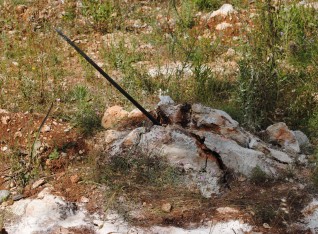Breaking the hardest rock with a mortar
May 18, 2018You almost can't buy normal digging spades here on Mallorca because it does not make any sense. As soon as you push down the spade in the soil you will hit a rock, either a small one or a big boulder. So don't waste your time trying to do it this way. If you want to dig a hole manually use a pickaxe with some weight which creates enough impact to make some decent progress. But still... it's hard work, especially when the soil is dry the work can be compared with pickaxing in concrete.
For digging holes you need excavators with small spoons. And if you hit large boulders or solid bedrock you need to change the spoon on the excavator for a hydraulic break hammer. You can also use manual electric break hammer either producing the force by an electric motor or by air.
It works well, although I can still take a long time before you have even created a decent crack in a solid boulder. Besides this it makes a lot of noise in the whole neighborhood. There is a quarry about 4 km from our finca and we can always here it when they are busy with their use break hammers. There is kind of 'line of sight' so there is no obstacle in between the quarry and our finca.
A few years back a Swedish mechanic worked here for a few months, fixing many issues on all our machines, taking apart complete diesel engines replacing push rods and such type of work which is not really my expertise and interest. He told me about a special powder which you mix with water and pour into holes which you first drill in the rock. The powder mixed with water starts a chemical reaction which creates another molecule which highly expands. It can break the hardest granite according to the websites of companies promoting this stuff. Seeing is believing, so I ordered a bucket with 15 kg of this power, which looks very much like normal grey cement. This is not really surprising because the main ingredient of the power consists of calcium hydroxide (chemical formula Ca(OH)2). The main ingredient of cement - or many years ago better known as portland or portland cement - is also calcium (Ca). Lime is in fact oxidized calcium (CaO) and gypsum is also closely related and CaSO4.2H2O, so it also contains sulfur (S). Portland cement does contain also calcium hydroxide, but does not expand if you mix it with water.
Does it work as they promise? YES !!!It takes quite a long time, 6 to 20 hours. You can have a kind of a blow out, which we also had with a few holes. Maybe the chemical process went too fast, I don't know. After digging a number of holes of various sizes (24, 30, 40 and 50 mm ; about 25 cm deep), we mixed the cement like powder with 30% water and poured the slurry in the holes. We covered the holes with large plastic plant pots to avoid direct sunlight entering the holes, which could speed up the chemical reaction too much. The next day we checked the holes and the cracks where there, but the inside of a few of the pots was completely light grey of the powder which the reaction produces. One hole was not leaking the slurry below, so we poured it in a small plastic bag and this bag was found 50 cm from the hole. So it does or it can explode a bit, which is not of any danger I guess as long as you don't plug the holes with force.
I really cannot believe that this slurry which becomes powder is able to expand so much in the hole sideways and does not force itself out to the opening of the hole, which gives zero resistance. But it works and I am very happy with this. The only thing we need to improve to make it work efficiently is to shorten the time to drill the holes. The next day I bought a 50 cm long SDS-Max drill of 32 mm with bits of diamonds on the head, and this speeded up the drilling, but only for the first couple of holes. I don't know but it seems to get blunt quickly. For a drill of €90 this is not really what you would expect. I know there are even better drills on the market, but you can't buy them in normal toolstores, so I will check the internet for this.
Another parameter which I want to change is the price of this high expanding mortar. I paid about €100 for a bucket of 15 kg, while they sell it in China (through Alibaba) for just us$200 per ton (1000 kg) ! I shopped around and many of the Chinese factories just sell it per 20 ft container, which can contain about 26,000 kg. A bit too much. I did not give up and contacted about 30 companies and finally I found one which is willing to sell me 1 pallet with 1000 kg of the stuff packed in carton boxes of 20 kg, which contain 4 plastic bags of 5 kg each. Price: us$600, transport by ship to Barcelona: us$200. The additional price from Barcelona to here is around €100. So for less than €1000 I will have a load of this stuff. Too much for me, but I intend to barter it for building material etc and offer some on Milanuncios.com, the eBay of Spain.
The story continues and I will keep you informed when I have made some progress, ordered the powder.
Have a great weekend !

